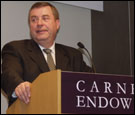{
"authors": [],
"type": "event",
"centerAffiliationAll": "dc",
"centers": [
"Carnegie Endowment for International Peace"
],
"collections": [],
"englishNewsletterAll": "",
"nonEnglishNewsletterAll": "",
"primaryCenter": "Carnegie Endowment for International Peace",
"programAffiliation": "russia",
"programs": [
"Russia and Eurasia"
],
"projects": [],
"regions": [
"North America",
"United States",
"Caucasus",
"Russia"
],
"topics": [
"Political Reform",
"Foreign Policy"
]
}
State Duma, Parliamentary Diplomacy, and U.S.-Russian Relations
Thu, May 2nd, 2002
Washington, D.C.
On Thursday, May 2nd, Andrew Kuchins chaired a discussion on "The State Duma, Parliamentary Diplomacy, and U.S. - Russian Relations" with His Excellency Gennady Seleznev. Mr. Gennady Seleznev was first elected to the Russian State Duma in 1993 and has served in various leadership roles in the Duma and Communist Party of the Russian Federation for the past decade. Gennady Seleznev has been Speaker of the Russian Duma since July 2000.
"Andrew Carnegie was one of the greatest businessmen of his time," began Mr. Seleznev. "But his greatest achievement was his effort to create world peace." At this moment in time, Russia and the United States are being called upon to further this goal. Fortunately, there exists a stable set of connections between these two countries ranging from student exchanges to cooperation in space. Included within this set of connections are the relations between the Parliament of Russia and the U.S. Congress.
Close contact between the two legislative bodies was initiated in December 1996. Last year, Congressmen Hastert and Gephardt were both received by the Duma. Thanks to the Open World Russian Leadership Program at the Library of Congress, more than 100 deputies of the Russian State Duma have visited the U.S. since 1999. These exchanges have created the foundation for parliamentary diplomacy between our two nations.
Key to this process of parliamentary diplomacy, according to Mr. Seleznev, is the expression of legislative opinion in the form of resolutions passed by the Duma. On the issue of U.S-Russian strategic relations, Mr. Seleznev pointed out that the Duma has passed a resolution that commits the Russian Federation to maintaining strategic stability and has followed through with reductions to Russia's nuclear arsenal as well as other measures designed to increase the security of Russia's weapons. On January 16th, the Duma passed a resolution condemning the U.S. abrogation of the ABM treaty as destabilizing. It is hoped that the forthcoming summit will help ameliorate this disturbance. However, problems remain concerning matters of verification and the counting of warheads. It is, in Mr. Seleznev's view, the joint duty of both countries to conclude new treaties that increase strategic stability. Regarding the question of Duma ratification of a possible nuclear arms reduction agreement that may be signed later this month, Mr. Selezenev said the Duma would not take up discussion of it until the U.S. congress ratifies the agreement.
The war on terrorism is another matter on which the U.S. and Russia share common goals. After September 11th, President Putin was one of the first leaders in the world to declare his support for the U.S. and the State Duma was quick to follow him. In the past few months, the Duma has taken steps to strengthen anti-terrorism legislation by adopting an anti-propaganda law and amendments to the judicial code. The Duma also supports cooperation with the U.S. in dealing with the Taliban. As observed, a 'zone of trust' has been established between the U.S. and Russia. But, as stated in a resolution passed on March 13th, the campaign against terrorism cannot be used to support action against Iran, North Korea or Iraq.
A great deal of attention has been paid to Russia's relations with Iran in particular. Mr. Seleznev asserted that much of the criticism that has been leveled against Russia has been unwarranted. Russia responsibly monitors its relations with Iran and has neither the intention nor desire to allow the proliferation of nuclear weapons.
Although there is, at present, a high level of cooperation between the Duma and the Congress, more should be done. To this end, Mr. Seleznev proposed that joint working groups be set up on issues ranging from trade and agriculture to crime and corruption, and most importantly on terrorism. At this point, Mr. Seleznev concluded his formal remarks and opened the floor to questions.
When asked to elaborate on the quality of the cooperation between the U.S. and Russia after September 11th, Mr. Seleznev pointed out that the U.S. has begun to look differently on the way Russia combats terrorism. Russia repeatedly warned the U.S. that the problem of Chechnya was linked to global terrorism and explained how Chechen terrorists abroad travel to gather financial support and recruit foreign support. Russia simply was ignored before 9/11. Now Russia's intelligence services exchange information about terrorist finances and activities with the U.S., but more must be done. Mr. Seleznev urged that resolute action be taken to stop the flow of drugs from Afghanistan (80% of which travel through the states of Central Asia and threaten to destabilize the entire region). Despite the U.S. presence in the region, the cultivation of poppies continues.
As regards U.S.-Russian economic ties, Mr. Seleznev expressed disappointment. In simple terms, trade and investment must be increased. The total trade between the U.S. and Russia was only $10 billion last year, while Russia's trade with tiny Belarus exceeded $11 billion. The repeal of Jackson-Vanik has run into difficulty and will most certainly not be completed in time for the summit. This summer, the EU will recognize Russia as a market economy and Mr. Seleznev suggested that this might be right time for the U.S. to do so as well.
With that, Dr. Kuchins thanked the speaker and closed the discussion.
Summary by Karlis Kirsis, Junior Fellow, Russian & Eurasian Program.
Carnegie does not take institutional positions on public policy issues; the views represented herein are those of the author(s) and do not necessarily reflect the views of Carnegie, its staff, or its trustees.